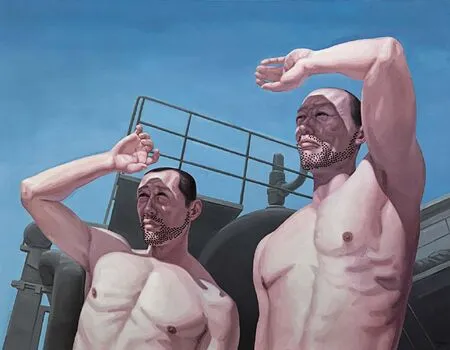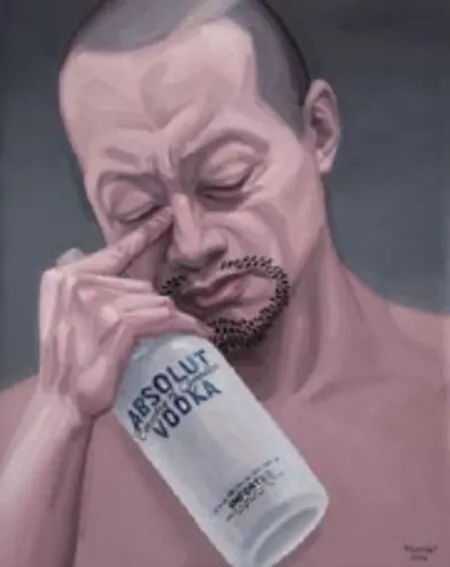ABSOLUTE ART
ABSOLUTE ART

Wait for Me! 2008
What are usually the inspirations and themes of your art?
My art describes the process of and the appearance of alienation in a severely alienated society. I don’t provide people happiness, I want them to get stirred up, even angered. I want people to know that they are alive because they are pained. My works are humorous, a very dark humor.
Do you think the generalization of art, labeling it “Chinese”, is valid? You mentioned before that the “Chinese” trait is related to the heart of the art market. Could you elaborate on that?
To me, art is a personal feeling, an expression; there’s no need to confi ne it in a sort of collective consciousness. As an individual, we live in this world, not a certain country. We just happened to be born in different countries and thus hold different passports. Especially in the information age that is today, everyone of us participates in globalization. A lot of curators and art market promoters like to stick a label on art for their clients to identify and collect, to give the ambitious investors an enticing excuse, but these are all marketing techniques that have nothing to do with art itself.

Du Xia (杜峽)
Born in Chongqing in 1966, Du Xia graduated from the Sichuan Fine Arts Institute in 1989. While many of his contemporaries have diversifi ed the media they use, oil painting is still Du Xia’s primary medium. His artworks are strongly political. As a
Chinese artist, he defi es his “Chinese-ness” and openly seeks to offer commentary on contemporary society.
Which artists have infl uenced you the most? How have Eastern and Western art cast different infl uences on you?
I’ve liked Greek and Roman art since I was little. I worship Giotto and Michelangelo. I like Caravaggio,
Rembrandt, and Van Gogh...Baselitz and Immendorff, who employed their art to say no to horrifying totalitarianism...I was born and grew up in China, but the infl uence Chinese civilization has had on me is next to zero.
The party newspaper Reference News is featured in several of your works. Are you concerned about ideology in media? What are your views on mainland media? All newspapers legally published on the Chinese mainland count as “party newspapers”. My paintings about newspapers are all titled “Absolute News”(絕對的新聞). In China, where media is strictly under control, news is absolute. I don’t think mainland media are news agencies, merely propaganda machines.
Has the government restricted your creative process?
The Chinese government’s restriction and interference into artistic creation is evident. For instance, some policies specifi cally state that works about certain topics cannot be exhibited. When government organizations participate in the curation of exhibitions, the restrictions are more strict. The state’s standpoint regarding contemporary art overall is non-supportive. The more infl uential an artist or writer is globally, the less likely you are to see them in state media.



(Top) Absolute Drink No.1, 2009(Middle) Absolute Vodka No.2, 2009 (Bottom) Absolute Vodka No.4, 2009
A lot of artists choose to avoid politics, many also think that politics is a bit“outdated”. Will you keep your focus on politics? Why?
Many artists now deliberately avoid political language, partly out of concern for the market or their personal artistic future. As for me, the idea that “keeping focused on politics” is a problem is invalid. I am an idealistic and daring artist, I am devoted to art, and I only answer fi rst to the calling of my heart and human conscience. Moreover, I am willing to risk failing to realize my artistic dreams.
Is your focus on politics related to your personal experience?
Not just my personal experience. China has always been a politicized state, every one of us live among politics. Even though many people think that their lives are about trudging through life far from politics, on some of the issues essential to our humanity, politics intercede into our lives with force, thus affecting the way we behave and think. Every Chinese that is alive today, regardless of the era they are born into, has had politics interfere with life. In the international realm of art, the kind of Chinese art that is the most interesting and most eligible to be a part of contemporary art needs to have political genes because the best art has always come from the most urgent spiritual needs of the artist’s era. - WEIJING ZHU (祝偉婧)

